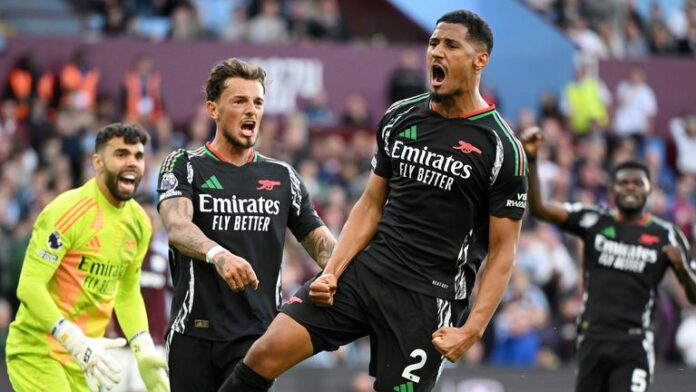William Saliba has emerged as a cornerstone in Arsenal’s defense, embodying the calm and composure that has been crucial for the team’s success. His presence on the field is akin to a totem, providing a sense of stability and assurance that reverberates throughout the squad. Saliba’s ability to read the game, coupled with his physical prowess and tactical intelligence, has made him indispensable to Mikel Arteta’s side. His composure under pressure and his knack for making crucial interceptions and tackles have often been the difference between victory and defeat for Arsenal. In many ways, Saliba’s influence on the team goes beyond his defensive duties; he is a leader, a calming presence that helps to organize the backline and instills confidence in those around him.
However, as vital as Saliba is to Arsenal, the recent additions of Jurrien Timber and Riccardo Calafiori offer the potential to ease the reliance on the Frenchman. Timber, a versatile defender with the ability to play both centrally and as a full-back, brings a new dimension to Arsenal’s defense. His agility, technical skills, and footballing intelligence make him an excellent partner or alternative to Saliba. Timber’s ability to transition quickly from defense to attack also aligns well with Arteta’s tactical approach, which emphasizes fluidity and ball retention. Having another defender of Timber’s caliber allows Arteta the flexibility to rotate his squad without compromising on quality, reducing the physical and mental burden on Saliba over the course of a long and demanding season.
Riccardo Calafiori, though primarily a left-back, also contributes to the defensive depth at Arsenal. His arrival provides cover for Kieran Tierney and ensures that Arsenal has options across the backline. Calafiori’s experience in Serie A, known for its tactical rigor and defensive discipline, has honed his understanding of the game. He brings a mix of youthful energy and tactical awareness that complements Arsenal’s existing defensive setup. While not a direct replacement for Saliba, Calafiori’s presence means that Arsenal can rest and rotate players without a significant drop in defensive solidity.
Moreover, the competition within the squad is likely to push all players to elevate their performances. Saliba, Timber, and Calafiori will each have to maintain high standards to secure their place in the starting eleven, which can only benefit Arsenal as a whole. This internal competition fosters an environment where complacency is kept at bay, and players are continually striving to improve.
In the broader context, easing the reliance on Saliba is crucial for Arsenal’s ambitions, both domestically and in Europe. The demands of modern football, with its congested fixture schedules and intense physical requirements, mean that no team can afford to be overly dependent on a single player. By integrating Timber and Calafiori into the defensive rotation, Arteta is not only safeguarding Saliba from potential burnout or injury but also building a more resilient and adaptable squad.
In conclusion, while William Saliba remains a pivotal figure in Arsenal’s defense, the arrivals of Jurrien Timber and Riccardo Calafiori are strategic moves that will enhance the team’s depth and flexibility. These signings ensure that Arsenal is not solely reliant on one player and is better equipped to navigate the challenges of a long and competitive season.


